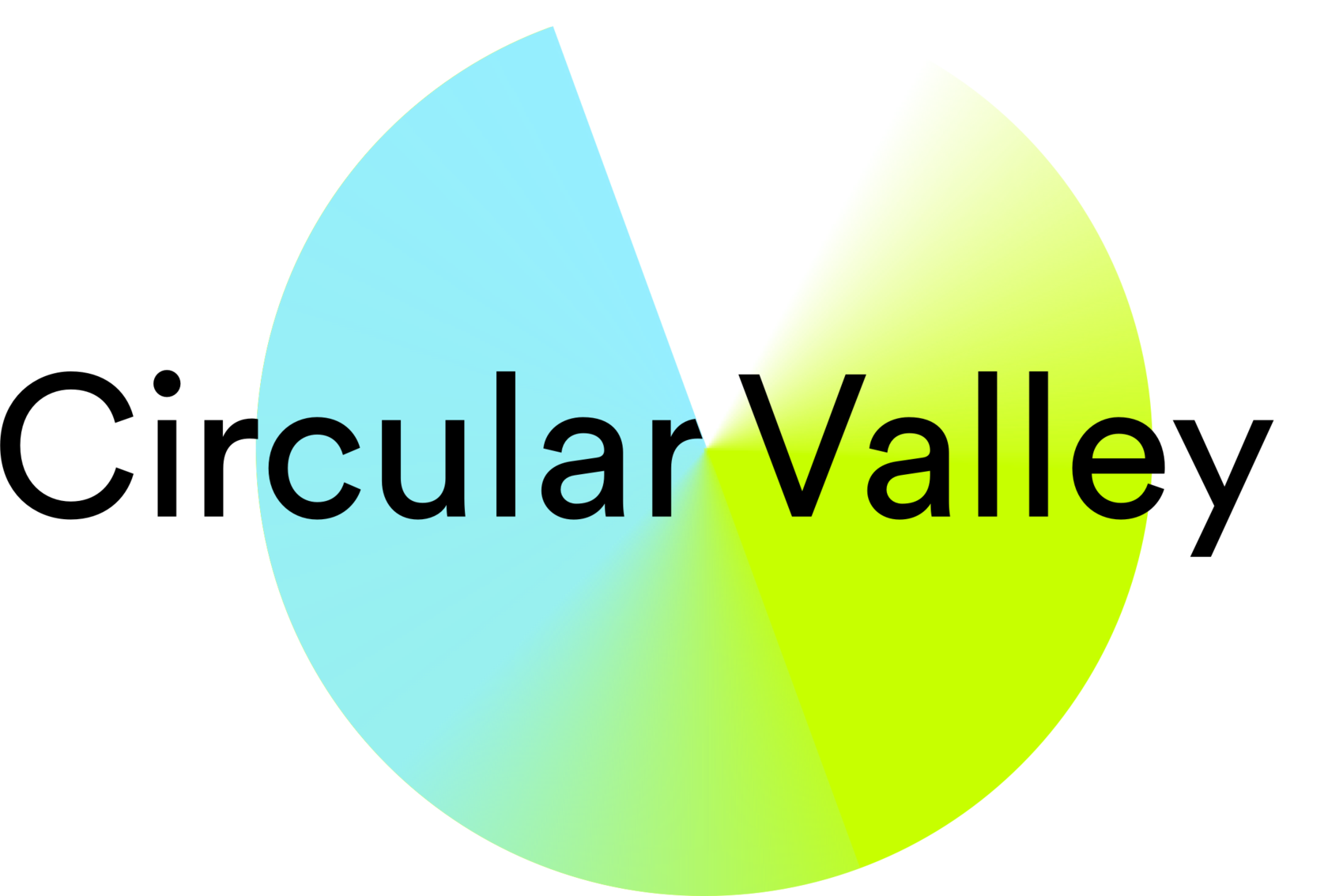Circular Valley
NEWSLETTER 1/2022
NEWSLETTER 1/2022
01.04.2022
- Keys for success
- Jochen Jehmlich, CEO of GEFA Bank
- Less plastic - better life
- Bioweg secures EU funding
- Better together
- Awarded by the United Nations
- "Commonwealth Young Person of the Year" at Circuar Valley
- Awarded in Dubai
- Location wanted
- Space Era at Solar Decathlon
- Batch#3 I Polis CONVENTION I Circular Valley® Conference
Demo Day
Demo Day creates a spirit of optimism

ECONOMY MINISTER OF NRW PROF. DR. ANDREAS PINKWART IN CONVERSATION WITH A START-UP FROM INDIA
SpaceEra
What is Silicon Valley's key for success? And will Circular Valley® become just as successful?
These questions asked by keynote speaker Channing Robertson were the common thread of the second Demo Day. More than 300 high-ranking guests from the world of business, science and politics listened attentively to the professor emeritus from Stanford University, who has first-hand experience about how Silicon Valley became what it is today. Now he has visited the Circular Valley®.
The Demo Day on March 3, 2022, marked the end of the second accelerator program of Circular Valley®. Startups from Vietnam, Ecuador, Brazil, Nigeria, Uganda, Zimbabwe, Lebanon, India, Latvia, France, Switzerland and Germany inspired the audience in the Wuppertal Stadthalle with their ideas for a Circular Economy. The young entrepreneurs offered insights into various sustainable business models, which differed greatly in terms of content. Tiles made from construction waste, a plant-based leather substitute, an upcycling network for old car tires, artificial intelligence for waste separation or the treatment of highly toxic industrial wastewater: there are circular solutions in almost every conceivable area and there are many realistic ways to replace the currently parasitic relationship between the economy and the environment by a symbiotic one.
The intensity of the preparations in the accelerator program was evident in the aplomb and quality on stage: in three-minute presentations the startups made the audience want to learn more. Afterwards, there was an opportunity for personal exchange and, in some cases, for finding future business partners in the foyer.
During the Demo Day, the impressive Circular Valley® network was also evident: Jochen Jehmlich, CEO of GEFA Bank and Chairman of the Board of Trustees of the Circular Valley® Foundation, expressed his thanks on behalf of the founders: "It exceeds my expectations by far." He also said that the internationality was a "huge success": "Cross-border cooperation, that's the world we want to live in."
In addition to partners and supporters from business and science, high-level politicians attended the demo day. In his opening speech, Prof. Dr. Andreas Pinkwart, Minister of Economics of North Rhine-Westphalia and patron of Circular Valley®, praised the "startup spirit" as the driver of the transformation to a Circular Economy. That is why the best possible conditions are being created for startups. He said it was "great to experience how Circular Valley® is proving itself in practice." He added: "If you continue at this pace, Circular Valley will have a huge impact on the economic development of Wuppertal, of Rhine-Ruhr and of North Rhine-Westphalia."
DGB Chairman Reiner Hoffmann emphasized the importance of the circular economy for the labour market. High-ranking representatives from the Ministry of the Environment of North Rhine-Westphalia and several members of the Bundestag and Landtag were also present.
What the guests took away was not only the awareness of the urgency that something must be changed, but also the certainty that there are already concrete approaches to solutions, as well as a spirit of optimism more contagious than Omicron. A little later, the FAZ headlined its follow-up report on the Demo Day: "A spirit like in Silicon Valley".
The guest of honor Channing Robertson, who is based there, concluded in his keynote speech that Circular Valley® has everything it needs to be successful, such as creativity, innovations and visions as well as economic, scientific and political framework conditions. What is important, he said, is that a culture is established in which failure is not condemned. Despite the physical distance, Silicon and Circular Valley® are already very close.
These questions asked by keynote speaker Channing Robertson were the common thread of the second Demo Day. More than 300 high-ranking guests from the world of business, science and politics listened attentively to the professor emeritus from Stanford University, who has first-hand experience about how Silicon Valley became what it is today. Now he has visited the Circular Valley®.
The Demo Day on March 3, 2022, marked the end of the second accelerator program of Circular Valley®. Startups from Vietnam, Ecuador, Brazil, Nigeria, Uganda, Zimbabwe, Lebanon, India, Latvia, France, Switzerland and Germany inspired the audience in the Wuppertal Stadthalle with their ideas for a Circular Economy. The young entrepreneurs offered insights into various sustainable business models, which differed greatly in terms of content. Tiles made from construction waste, a plant-based leather substitute, an upcycling network for old car tires, artificial intelligence for waste separation or the treatment of highly toxic industrial wastewater: there are circular solutions in almost every conceivable area and there are many realistic ways to replace the currently parasitic relationship between the economy and the environment by a symbiotic one.
The intensity of the preparations in the accelerator program was evident in the aplomb and quality on stage: in three-minute presentations the startups made the audience want to learn more. Afterwards, there was an opportunity for personal exchange and, in some cases, for finding future business partners in the foyer.
During the Demo Day, the impressive Circular Valley® network was also evident: Jochen Jehmlich, CEO of GEFA Bank and Chairman of the Board of Trustees of the Circular Valley® Foundation, expressed his thanks on behalf of the founders: "It exceeds my expectations by far." He also said that the internationality was a "huge success": "Cross-border cooperation, that's the world we want to live in."
In addition to partners and supporters from business and science, high-level politicians attended the demo day. In his opening speech, Prof. Dr. Andreas Pinkwart, Minister of Economics of North Rhine-Westphalia and patron of Circular Valley®, praised the "startup spirit" as the driver of the transformation to a Circular Economy. That is why the best possible conditions are being created for startups. He said it was "great to experience how Circular Valley® is proving itself in practice." He added: "If you continue at this pace, Circular Valley will have a huge impact on the economic development of Wuppertal, of Rhine-Ruhr and of North Rhine-Westphalia."
DGB Chairman Reiner Hoffmann emphasized the importance of the circular economy for the labour market. High-ranking representatives from the Ministry of the Environment of North Rhine-Westphalia and several members of the Bundestag and Landtag were also present.
What the guests took away was not only the awareness of the urgency that something must be changed, but also the certainty that there are already concrete approaches to solutions, as well as a spirit of optimism more contagious than Omicron. A little later, the FAZ headlined its follow-up report on the Demo Day: "A spirit like in Silicon Valley".
The guest of honor Channing Robertson, who is based there, concluded in his keynote speech that Circular Valley® has everything it needs to be successful, such as creativity, innovations and visions as well as economic, scientific and political framework conditions. What is important, he said, is that a culture is established in which failure is not condemned. Despite the physical distance, Silicon and Circular Valley® are already very close.
IMPRESSIONS
03.03.2022
3 Questions to …
Jochen Jehmlich, CEO of GEFA Bank
1. What is so special about Cirular Valley®?
Circular Valley® brings together what it takes to drive the transformation of the economy towards circularity. Inspired young startups with new ideas and experienced companies connect here to work on the future together. The internationality and the cross-industry approach combined with great commitment of high quality - all this makes Circular Valley® so unique.
2. Why are you involved in Circular Valley®?
It is an important part of our corporate strategy to encourage the idea of circularity. Developing and implementing the idea of a circular economy requires different players from business, politics and science. Including not only manufacturing companies but also financial service providers. The dedicated Circular Valley® network links all the players involved and is thus an ideal platform for constructive exchange.
3. How do you personally live sustainability?
During the last two years we have significantly reduced our family's energy consumption by installing a PV system including battery and a new heating system. In addition, we have prepared ourselves to purchase an electrically powered car and we pay more attention to reducing food packaging as much as possible.
Circular Valley® brings together what it takes to drive the transformation of the economy towards circularity. Inspired young startups with new ideas and experienced companies connect here to work on the future together. The internationality and the cross-industry approach combined with great commitment of high quality - all this makes Circular Valley® so unique.
2. Why are you involved in Circular Valley®?
It is an important part of our corporate strategy to encourage the idea of circularity. Developing and implementing the idea of a circular economy requires different players from business, politics and science. Including not only manufacturing companies but also financial service providers. The dedicated Circular Valley® network links all the players involved and is thus an ideal platform for constructive exchange.
3. How do you personally live sustainability?
During the last two years we have significantly reduced our family's energy consumption by installing a PV system including battery and a new heating system. In addition, we have prepared ourselves to purchase an electrically powered car and we pay more attention to reducing food packaging as much as possible.

Jochen Jehmlich, CEO of GEFA Bank
PLASTIC FISCHER
Less plastic - better life
Circular Valley® partner KNIPEX supports Plastic Fischer in its work in Varanasi and Bangalore, India. A total of 19 tons of plastic waste have already been removed from the tributaries of the Ganges due the support of the Wuppertal-based company. This has contributed to plastic reduction in regions where waste otherwise ends up in the oceans and has a massive impact on people's lives. Due to the cooperation 17 locals were hired, who now earn a regular income.
"We particularly like the fact that Plastic Fischer not only "fishes" for plastic, but at the same time builds an infrastructure for waste management and provides locals with a job and a regular income. A win-win-win solution." explains Barbara Meimeth, Sustainability Officer at KNIPEX, the cooperation with Plastic Fischer.
Plastic Fischer was part of Batch#1 of the Circular Valley Accelerator (CEA) and has developed a solution for collecting plastic in ocean tributaries. The company focuses on technical feasibility with simple on-the-ground requirements while also building a waste management infrastructure. Plastic Fischer spreads the cost of the quantities of collected and processed plastic among several sponsors. Both, companies and private individuals can get involved.
More than 32 tons of plastic were retrieved and processed from rivers in 2021. For 2022, Plastic Fischer plans to increase last year's impact at least tenfold. Currently, over 40 full-time employees work in India and Indonesia. Plastic Fischer plans to expand its 4 locations to at least 7 this year.
"We particularly like the fact that Plastic Fischer not only "fishes" for plastic, but at the same time builds an infrastructure for waste management and provides locals with a job and a regular income. A win-win-win solution." explains Barbara Meimeth, Sustainability Officer at KNIPEX, the cooperation with Plastic Fischer.
Plastic Fischer was part of Batch#1 of the Circular Valley Accelerator (CEA) and has developed a solution for collecting plastic in ocean tributaries. The company focuses on technical feasibility with simple on-the-ground requirements while also building a waste management infrastructure. Plastic Fischer spreads the cost of the quantities of collected and processed plastic among several sponsors. Both, companies and private individuals can get involved.
More than 32 tons of plastic were retrieved and processed from rivers in 2021. For 2022, Plastic Fischer plans to increase last year's impact at least tenfold. Currently, over 40 full-time employees work in India and Indonesia. Plastic Fischer plans to expand its 4 locations to at least 7 this year.

PLASTIC FISCHER

Compensation
certificate
certificate
BIOWEG
Bioweg secures EU funding
The EU's European Innovation Council Accelerator, which identifies and supports breakthrough technologies and innovations with disruptive potential, has set its largest-ever funding round with a total of €627 million. Quakenbrueck-based startup Bioweg, a participant in Circular Economy Accelerator Batch#2, succeeded in receiving a €12.5 million grant to develop its business.
Bioweg has developed a biodegradable alternative to microplastics based on the fermentation of bacterial cellulose from waste generated by the food industry. The EU funding will help the startup expand its production facility.
In a rigorous process involving an idea screening stage, full applications assessed by external experts and an interview with a jury of experienced investors and entrepreneurs, 99 innovative startups and SMEs from 21 countries competed for the EU funds, which were awarded to bring promising technologies to market.
Bioweg has developed a biodegradable alternative to microplastics based on the fermentation of bacterial cellulose from waste generated by the food industry. The EU funding will help the startup expand its production facility.
In a rigorous process involving an idea screening stage, full applications assessed by external experts and an interview with a jury of experienced investors and entrepreneurs, 99 innovative startups and SMEs from 21 countries competed for the EU funds, which were awarded to bring promising technologies to market.

Bioweg
CARBONAUTEN
Better together
The HUEHOCO GROUP Holding GmbH & Co. KG, a Circular Valley® partner from the very beginning, has acquired a 5 percent stake in carbonauten GmbH.
The Baden-Württemberg-based startup, a participant of CEA Batch#1, develops solutions to reduce CO2 emissions and costs on an industrial scale. Decentralized carbonization plants biomass residues into biocarbons, also producing base-load renewable energy. Each ton of these biocarbons stores the equivalent of up to 3.3 tons of CO2.
"As entrepreneurs, we expected a lot from the very first Circular Valley® batch. But certainly, we never dreamed, to go into business with a first-round startup, whose idea of reducing CO2 emissions was at the highest technical level already. So, the idea of Circular Valley® became reality for us." commented Iris and André Bovenkamp, managing partners of the HUEHOCO Group. "For our HUEHOCO Group - as well as for many other companies - Circular Valley® is a perfect way to realize the environmentally conscious, innovative startup ideas by not only supporting but also embedding in already existing industries."
Torsten Becker, founder of carbonauten, explains the relevance of the investment as follows: "HUEHOCO is an important strategic partner for us, their investment shows that our solutions are relevant for the industry. In addition, we have similar values - both sides consider ecology and economy to be a holistic and harmonious system."
Applications of the carbonauten technology range from agriculture to the plastics industry and construction. The pilot plant in Eberswalde is scheduled to go into operation this spring.
The Baden-Württemberg-based startup, a participant of CEA Batch#1, develops solutions to reduce CO2 emissions and costs on an industrial scale. Decentralized carbonization plants biomass residues into biocarbons, also producing base-load renewable energy. Each ton of these biocarbons stores the equivalent of up to 3.3 tons of CO2.
"As entrepreneurs, we expected a lot from the very first Circular Valley® batch. But certainly, we never dreamed, to go into business with a first-round startup, whose idea of reducing CO2 emissions was at the highest technical level already. So, the idea of Circular Valley® became reality for us." commented Iris and André Bovenkamp, managing partners of the HUEHOCO Group. "For our HUEHOCO Group - as well as for many other companies - Circular Valley® is a perfect way to realize the environmentally conscious, innovative startup ideas by not only supporting but also embedding in already existing industries."
Torsten Becker, founder of carbonauten, explains the relevance of the investment as follows: "HUEHOCO is an important strategic partner for us, their investment shows that our solutions are relevant for the industry. In addition, we have similar values - both sides consider ecology and economy to be a holistic and harmonious system."
Applications of the carbonauten technology range from agriculture to the plastics industry and construction. The pilot plant in Eberswalde is scheduled to go into operation this spring.

carbonauten GmbH / HUEHOCO
POLYCARE
Awarded by the United Nations
Polycare, a startup supported by Circular Valley® in Batch #1, wins in the Circular Economy and Industrial Development category of the UNIDO Global Call 2021, focusing on innovative technological solutions that lead to greater resource efficiency and cleaner production processes.
Polycare's solution of building blocks made of polymer concrete with inferior sands or processed waste and recycled PET convinced the jury of being an important contribution to sustainable and circular construction. The polyblocks were selected from 66 competitors in the same category and 294 applications in total.
The UNIDO Global Call 2021 was initiated by the UNIDO Investment and Technology Promotion Office (ITPO) Germany in cooperation with UNFCCC and UNCCD. It was implemented in close collaboration with the German think tank Future Cleantech Architects.
The winners subsequently presented their solution at COP26 in Glasgow.
Polycare's solution of building blocks made of polymer concrete with inferior sands or processed waste and recycled PET convinced the jury of being an important contribution to sustainable and circular construction. The polyblocks were selected from 66 competitors in the same category and 294 applications in total.
The UNIDO Global Call 2021 was initiated by the UNIDO Investment and Technology Promotion Office (ITPO) Germany in cooperation with UNFCCC and UNCCD. It was implemented in close collaboration with the German think tank Future Cleantech Architects.
The winners subsequently presented their solution at COP26 in Glasgow.

Polycare
Quelle: unido.org

COP26 in Glasgow
UNIDO
UNIDO
ECOPLASTILE
"Commonwealth Young Person of the Year" at Circuar Valley
Frank Kamugyisha was named Commonwealth Young Person of the Year. The founder and CEO of Ecoplastile from Uganda was a participant in the Circular Economy Accelerator Batch#2.
Kamugyisha is not only the regional winner for Africa, but also takes home the prestigious title of Commonwealth Person of the Year for his work with Ecoplastile - a recycling initiative that makes durable, affordable roof tiles from various plastics, glass, sand and agricultural residues, and turns consumer waste into biodegradable face masks.
Organized by the Commonwealth Youth Program, the awards recognize outstanding young people aged 15 to 29 from different Commonwealth regions (Caribbean, Africa, Asia, Europe, Canada, Australia and the Pacific) whose projects transform the lives of their communities by providing practical solutions to complex problems and by contributing to achieving the UN Sustainable Development Goals and the 2030 Agenda.
Kamugyisha is not only the regional winner for Africa, but also takes home the prestigious title of Commonwealth Person of the Year for his work with Ecoplastile - a recycling initiative that makes durable, affordable roof tiles from various plastics, glass, sand and agricultural residues, and turns consumer waste into biodegradable face masks.
Organized by the Commonwealth Youth Program, the awards recognize outstanding young people aged 15 to 29 from different Commonwealth regions (Caribbean, Africa, Asia, Europe, Canada, Australia and the Pacific) whose projects transform the lives of their communities by providing practical solutions to complex problems and by contributing to achieving the UN Sustainable Development Goals and the 2030 Agenda.

Ecoplastile
Frank Kamugyisha
DIWAMA
Awarded in Dubai
In January 2022, Diwama won the second prize in the Smartpreneur Competition 6.0 in Dubai organized by the Dubai Chamber of Commerce and the Dubai Startup Hub. In line with the Expo 2020 Dubai, the competition was open for technology-enabled startups in the MENA Region in the fields of sustainability, opportunity and trade.
Diwama, with its AI-powered image recognition software that can be used in municipal material recovery facilities, was the only winner operating in sustainability and circular economy. The software helps improve waste analysis to increase recycling rates.
Diwama, with its AI-powered image recognition software that can be used in municipal material recovery facilities, was the only winner operating in sustainability and circular economy. The software helps improve waste analysis to increase recycling rates.

Diwama
Quelle: Diwama
ROSI SOLAR
Location wanted
ROSI Solar is currently looking for an industrial site in Wuppertal and the surrounding area to set up its first factory for recycling photovoltaic systems in Germany.
The CEA Batch#2 startup is working on efficient recycling of solar modules. Proper recycling of end-of-live PV modules not only reduces industrial waste, but also provides a high-yield source of highly pure raw materials such as high-purity silicon, silver and copper.
Europe offers a large market for circular solutions for the PV industry. Already active in France, ROSISolar is now looking to expand its business to Germany, the largest European PV market.
The realization would be an exclamation point in terms of circular economy: The first PV systems exceeded their life cycle and need to be recycled and also silicon is a scarce and expensive raw commodity. Circular Valley® supports ROSI Solar in the search for an industrial site and hopes to find the right premises despite the lack of industrial space in the region.
The CEA Batch#2 startup is working on efficient recycling of solar modules. Proper recycling of end-of-live PV modules not only reduces industrial waste, but also provides a high-yield source of highly pure raw materials such as high-purity silicon, silver and copper.
Europe offers a large market for circular solutions for the PV industry. Already active in France, ROSISolar is now looking to expand its business to Germany, the largest European PV market.
The realization would be an exclamation point in terms of circular economy: The first PV systems exceeded their life cycle and need to be recycled and also silicon is a scarce and expensive raw commodity. Circular Valley® supports ROSI Solar in the search for an industrial site and hopes to find the right premises despite the lack of industrial space in the region.

Rosi Solar
SPACE ERA
Space Era at Solar Decathlon
Using local, sustainable, and recycled building materials, startup Space Era, a participant in CEA Batch#2, has developed a prototype low-cost emergency shelter home made from recycled materials. This prototype not only serves as a safe quarantine shelter but can be used in many humanitarian emergencies as well.
To bring the idea to real life Space Era will present a 1:1 model at the Solar Decathlon in Wuppertal in June. Circular Valley® is a close partner in the realization.
The Solar Decathlon Europe 21/22 will take place from June 10 to 26, 2022. The event for sustainable cities is all about urban building and living.
To bring the idea to real life Space Era will present a 1:1 model at the Solar Decathlon in Wuppertal in June. Circular Valley® is a close partner in the realization.
The Solar Decathlon Europe 21/22 will take place from June 10 to 26, 2022. The event for sustainable cities is all about urban building and living.

Space Era
Outlook 2022
Batch#3
After a successfully completed call for proposals, the Circular Valley® expert driven evaluation process of new startups for Batch#3 is currently underway. Batch#3 will start on June 6, 2022. The next Demo Day will take place on September 9, 2022.
Polis CONVENTION
Circular Valley® will participate at the polis CONVENTION 2022 at the Areal Böhler in Düsseldorf on April 27- 28, 2022. Together with our partners Solar Decathlon, Bergische Universität and Neue Effizienz, we will be representing "BERGISCH. NACHHALTIG." – strong partners in transforming the resource-intensive construction industry to a sustainable circular economy. The polis CONVENTION is Germany's leading trade fair for urban and project development.
Circular Valley® Conference
Circular Valley® and our partners will host the first Circular Valley® Conference on November 18, 2022. High-profile speakers and experts will engage with an interested audience in discussions and workshops on the topic of the circular economy.
After a successfully completed call for proposals, the Circular Valley® expert driven evaluation process of new startups for Batch#3 is currently underway. Batch#3 will start on June 6, 2022. The next Demo Day will take place on September 9, 2022.
Polis CONVENTION
Circular Valley® will participate at the polis CONVENTION 2022 at the Areal Böhler in Düsseldorf on April 27- 28, 2022. Together with our partners Solar Decathlon, Bergische Universität and Neue Effizienz, we will be representing "BERGISCH. NACHHALTIG." – strong partners in transforming the resource-intensive construction industry to a sustainable circular economy. The polis CONVENTION is Germany's leading trade fair for urban and project development.
Circular Valley® Conference
Circular Valley® and our partners will host the first Circular Valley® Conference on November 18, 2022. High-profile speakers and experts will engage with an interested audience in discussions and workshops on the topic of the circular economy.

